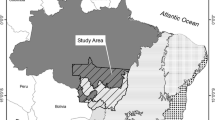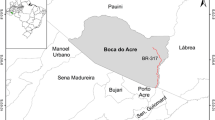Abstract
This paper evaluates compliance with environmental laws in the municipality of Sorriso and the impact of changing legislation on vegetation. To verify the size of the properties, the areas designated as legal reserves (LRs), permanent protection areas (APPs), and springs were studied. Details of compliance with the New Forest Code (NFC) were drawn from the Rural Environmental Register (CAR) database. The database provided by PRODES/CERRADO was used to gather data to monitor deforested areas. SojaMaps data were used to verify the areas used for soybean cultivation followed by the Perpendicular Crop Enhancement Index. The data were plotted and superimposed on the deforestation data provided by PRODES/CERRADO. The areas were calculated using QGiS software version 2.18.22. The results showed that only 20.04% of the original Cerrado vegetation cover remains in the municipality. The results also revealed environmental LR, APP, and spring deficits of 92,772.32, 1,656.28, and 322.86 ha, respectively. Measures such as the CAR in the New Forest Code are ineffective for inhibiting illegal deforestation, and new legislation authorized the loss of 75.22% of the APP areas due for recovery. The proposed changes to eliminate LRs will allow the suppression of 91,000 ha of vegetation in Sorriso. Expanding the Amazon Soy Moratorium to the Cerrado could bring immediate benefits to the maintenance of the last continuous forested areas in this biome.


Similar content being viewed by others
References
ABIOVE, 2020. ABIOVE reage às críticas de membros do SOS Cerrado. Disponível. https://abiove.org.br/abiove-na-midia/abiove-reage-as-criticas-de-membros-do-sos-cerrado/. Accessed 18 December 2020.
Alvares, C.A., Stape, J.L., Sentelhas, P.0,C., de Moraes, G., Leonardo, J., Sparovek, G., 2013. Köppen's climate classification map for Brazil. Meteorologische Zeitschrift 22, 711-728. Doi: https://doi.org/10.1127/0941-2948/2013/0507
Alves, G. H. Z., Tófoli, R. M., Rodrigues-Filho, J. L., Sacramento, P. A., Cionek, V. M., Figueiredo, B. R. S., & do Couto, E. V., . (2020). Brazil’s vegetation ravage may be encouraged by law. Biodiversity and Conservation. https://doi.org/10.1007/s10531-020-01933-7
ABIOVE, 2019. National Association of Cereal Exporters. ANEC - Associação Brasileira das Indústrias de Óleos Vegetais http://www.sojaplus.org.br.
Assunção, J., Gandour, C., Pessoa, P., & Rocha, R. (2017). Property-level assessment of change in forest clearing patterns: The need for tailoring policy in the Amazon. Land Use Policy, 66, 18–27. https://doi.org/10.1016/j.landusepol.2017.04.022
Azevedo, A. A., Rajão, R., Costa, M. A., Stabile, M. C., Macedo, M. N., dos Reis, T. N., & Pacheco, R. (2017). Limits of Brazil’s Forest Code as a means to end illegal deforestation. Proceedings of the National Academy of Sciences, 114, 7653–7658. https://doi.org/10.1073/pnas.1604768114
Azevedo-Ramos, C., & Moutinho, P. (2018). No man’s land in the Brazilian Amazon: Could undesignated public forests slow Amazon deforestation? Land Use Policy, 73, 125–127. https://doi.org/10.1016/j.landusepol.2018.01.005
Bonanomi, J., Tortato, F. R., Santos, R., Penha, J. M., Bueno, A. S., & Peres, C. A. (2019). Protecting forests at the expense of native grasslands: Land-use policy encourages open-habitat loss in the Brazilian cerrado biome. Perspectives in Ecology and Conservation, 17(1), 26–31. https://doi.org/10.1016/j.pecon.2018.12.002
Brancalion, P. H., Garcia, L. C., Loyola, R., Rodrigues, R. R., Pillar, V. D., & Lewinsohn, T. M. (2016). A critical analysis of the native vegetation protection law of Brazil (2012): Updates and ongoing initiatives. Natureza & Conservação, 14, 1–15. https://doi.org/10.1016/j.ncon.2016.03.003
Brandão, A., Jr., Rausch, L. L., Durán, A. P., Costa, C., Jr., Spawn, S. A., & Gibbs, H. K. (2020). Estimating the Potential for Conservation and Farming in the Amazon and Cerrado under Four Policy Scenarios. Sustainability, 12, 1277. https://doi.org/10.3390/su1203127
BRASIL, 2012. Código Florestal. Brasil: Casa Civil - Presidência da República. http://www.planalto.gov.br/ccivil_03/_Ato2011-2014/2012/Lei/L12651.htm.
Butchart, S. H., Clarke, M., Smith, R. J., Sykes, R. E., Scharlemann, J. P., Harfoot, M., & Brooks, T. M. (2015). Shortfalls and solutions for meeting national and global conservation area targets. Conservation Letters, 8, 329–337. https://doi.org/10.1111/conl.12158
CAR, 2018: Cadastro Ambiental Rural: http://www.car.gov.br/publico/imoveis/index. Accessed 18 September 2018.
Chiaretti, D., 2019. Projeto põe em risco vegetação nativa de ’três Bahias’. Valor Econômico. https://bit.ly/2K9bxM3. Accessed 28 January 2021.
Ermgassen, E. K. H. J. zu, Ayre, B., Godar, J., Lima, M. G. B., Bauch, S., Garrett, R., Green, J., Lathuillière, M. J., Löfgren, P., MacFarquhar, C., Meyfroidt, P., Suavet, C., West, C., & Gardner, T. (2020). Using supply chain data to monitor zero deforestation commitments: an assessment of progress in the Brazilian soy sector. Environment Resourse Letter, 15, 035003. https://doi.org/10.1088/1748-9326/ab6497
Gibbs, H. K., Munger, J., L’Roe, J., Barreto, P., Pereira, R., Christie, M., & Walker, N. F. (2016). Did ranchers and slaughterhouses respond to zero-deforestation agreements in the Brazilian Amazon? Conservation Letters, 9(1), 32–42. https://doi.org/10.1111/conl.12175
Gibbs, H. K., Rausch, L., Munger, J., Schelly, I., Morton, D. C., Noojipady, P., & Walker, N. F. (2015). Brazil’s soy moratorium. Science, 347, 377–378. https://doi.org/10.1126/science.aaa0181
Gollnow, F., & Lakes, T. (2014). Policy change, land use, and agriculture: The case of soy production and cattle ranching in Brazil, 2001–2012. Applied Geography, 55, 203–211. https://doi.org/10.1016/j.apgeog.2014.09.003
IBGE- Instituto Brasileiro de Geografia e Estatística, 2018. https://cidades.ibge.gov.br/brasil/mt/sorriso/panorama. Access 03 Dec 2018.
INCRA, 2018. Instituto Nacional de Colonização e Reforma Agraria. http://www.incra.gov.br/Tabela-módulo-fiscal. http://www.incra.gov.br/sites/default/files/uploads/estrutura-fundiaria/regularizacao-fundiaria/indices-cadastrais/indices_basicos_2013_por_municipio.pdf. Accessed 19 Sep 2018.
INPE, 2018. Instituto de Nacional de Pesquisas Espaciais: Projeto de Desenvolvimento de Sistemas de Prevenção de Incêndios Florestais e Monitoramento da Cobertura Vegetal no Cerrado Brasileiro. http://terrabrasilis.info/composer/CERRADO. Accessed 17 Sep 2018.
INPE, 2021. Instituto Nacional de Pesquisas Espaciais: Coordenação Geral de Observação da Terra. Programa de Monitoramento da Amazônia e demais biomas. Desmatamento-Amazônia Legal. http://terrabrasilis.dpi.inpe.br/downloads/. Accessed 05 January 2021.
Karam-Gemael, M., Loyola, R., Penha, J., & Izzo, T. (2018). Poor alignment of priorities between scientists and policymakers highlights the need for evidence-informed conservation in Brazil. Perspectives in Ecology and Conservation, 16, 125–132. https://doi.org/10.1016/j.pecon.2018.06.002
Lima, M., Silva Junior, C. A., Rausch, L., Gibbs, H. K., & Johann, J. A. (2019). Demystifying sustainable soy in Brazil. Land Use Policy, 82, 349–352. https://doi.org/10.1016/j.landusepol.2018.12.016
Metzger, J. P. (2010). O Código Florestal tem base científica? Natureza & Conservação, 8, 92–99. https://doi.org/10.4322/natcon.00801017
MMA, 2019. Ministério do Meio Ambiente Instrução Normativa MMA nº 2 de 5 de maio de 2014. http://www.car.gov.br/leis/IN_CAR.pdf. Access 30 Jan 2019.
Montibeller, B., Kmoch, A., Virro, H., Mander, U., & Uuemaa, E. (2020). Increasing fragmentation of forest cover in Brazil’s Legal Amazon from 2001 to 2017. Scientific Reports, 10, 5803. https://doi.org/10.1038/s41598-020-62591-x
Noojipady, P., Morton, C. D., Macedo, N. M., Victoria, C. D., Huang, C., Gibbs, K. H., & Bolfe, L. E. (2017). Forest carbon emissions from cropland expansion in the Brazilian Cerrado biome. Environmental Research Letters, 12, 025004. https://doi.org/10.1088/1748-9326/aa5986
Ramos, C. C. O., & Anjos, L. (2014). The width and biotic integrity of riparian forests affect richness, abundance, and composition of bird communities. Natureza & Conservação, 12, 59–64. https://doi.org/10.4322/natcon.2014.011
Rausch, L. L., Gibbs, H. K., Schelly, I., Brandão, A., Jr., Morton, D. C., Carneiro Filho, A., & Meyer, D. (2019). Soy expansion in Brazil’s Cerrado. Conserv. Letters, 12, e12671. https://doi.org/10.1111/conl.12671
Richards, P. D., & VanWey, L. (2016). Farm-scale distribution of deforestation and remaining forest cover in Mato Grosso. Nature Climate Change, 6, 418. https://doi.org/10.1038/NCLIMATE2854
Silva Junior, C. A., Nanni, M. R., Teodoro, P. E., & Silva, G. F. C. (2017). Vegetation indices for discrimination of soybean areas: A new approach. Agronomy Journal, 109, 1331–1343. https://doi.org/10.2134/agronj2017.01.0003
Silva Junior, C. A., Teodoro, P. E., Delgado, R. C., Teodoro, L. P. R., Lima, M., Pantaleão, A. A., & Facco, C. U. (2020). Persistent fire foci in all biomes undermine the Paris Agreement in Brazil. Scientific Reports, 10, 16246. https://doi.org/10.1038/s41598-020-72571-w
Sistema de Estimativas de Emissões de Gases de Efeito Estufa - SEEG, 2018. Emissões do setor de mudança do uso da terra. http://www.observatoriodoclima.eco.br/wpcontent/uploads/2018/05/Relato%CC%81rios-SEEG-2018-MUT-Final-v1.pdf?utm_ source=newsletter&utm_medium=email&utm_campaign=desmatamento_no_ cerrado_emite_mais_que_industria_mostram_dados_do_seeg&utm_term=2018–06–03.
Siqueira, A., Ricaurte, L. F., Borges, G. A., Nunes, G. M., & Wantzen, K. M. (2015). The role of private rural properties for conserving native vegetation in Brazilian Southern Amazonia. Regional Environmental Change, 18, 1–12. https://doi.org/10.1007/s10113-015-0824-z
Soares-Filho, B., Rajão, R., Macedo, M., Carneiro, A., Costa, W., Coe, M., & Alencar, A. (2014). Cracking Brazil’s forest code. Science, 344, 363–364. https://doi.org/10.1126/science.1246663
SojaMaps, 2021. GAAF-Geotecnologia Aplicada em Agricultura e Floresta. UNEMAT Alta floresta. http://pesquisa.unemat.br/gaaf/sojamaps.
Souza Junior, C., Shimbo, J. Z., Rosa, M. R., Parente, L. L., Alencar, A. A., Rudorff, B. F. T., & Azevedo, T. (2020). Reconstructing three decades of land use and land cover changes in Brazilian biomes with Landsat Archive and Earth Engine. Remote Sensing, 12(17), 2735. https://doi.org/10.3390/rs12172735
Spera, S. (2017). Agricultural intensification can preserve the Brazilian Cerrado: Applying lessons from Mato Grosso and Goiás to Brazil’s last agricultural frontier. Tropical Conservation Science, 10, 1940082917720662. https://doi.org/10.1177/1940082917720662
Strassburg, B. B., Brooks, T., Feltran-Barbieri, R., Iribarrem, A., Crouzeilles, R., Loyola, R., & Soares-Filho, B. (2017). Moment of truth for the Cerrado hotspot. Nature Ecology & Evolution, 1, 0099. https://doi.org/10.1038/s41559-017-0099
Vieira, R. R. S., Ribeiro, B. R., Resende, F. M., Brum, F. T., Machado, N., Sales, L. P., & Loyola, R. (2018). Compliance to Brazil’s forest code will not protect biodiversity and ecosystem services. Diversity and Distributions, 24, 434–438. https://doi.org/10.1111/ddi.12700
West, T. A. P., & Fearnside, P. M. (2021). Brazil’s conservation reform and the reduction of deforestation in Amazonia. Land Use Police, 100, 105072. https://doi.org/10.1016/j.landusepol.2020.105072
Zimbres, B., Machado, R. B., & Peres, C. A. (2018). Anthropogenic drivers of headwater and riparian forest loss and degradation in a highly fragmented southern Amazonian landscape. Land Use Policy, 72, 354–363. https://doi.org/10.1016/j.landusepol.2017.12.062
Acknowledgements
This work was supported by the Brazilian Ministry of Education and CAPES (Coordenação de Aperfeiçoamento de Pessoal de Nível Superior) through a postgraduate studentship granted to R. C. S.
Author information
Authors and Affiliations
Corresponding author
Additional information
Publisher's Note
Springer Nature remains neutral with regard to jurisdictional claims in published maps and institutional affiliations.
Rights and permissions
About this article
Cite this article
dos Santos, R.C., da Silva Junior, C.A., Battirola, L.D. et al. Importance of legislation for maintaining forests on private properties in the Brazilian Cerrado. Environ Dev Sustain 24, 3356–3370 (2022). https://doi.org/10.1007/s10668-021-01569-9
Received:
Accepted:
Published:
Issue Date:
DOI: https://doi.org/10.1007/s10668-021-01569-9




